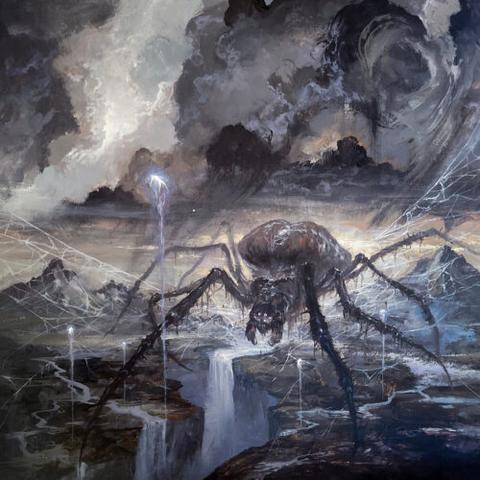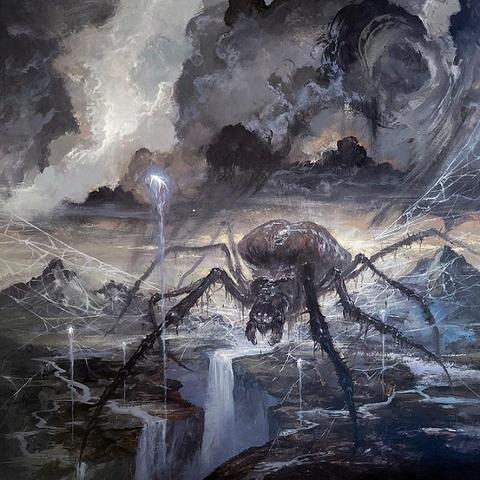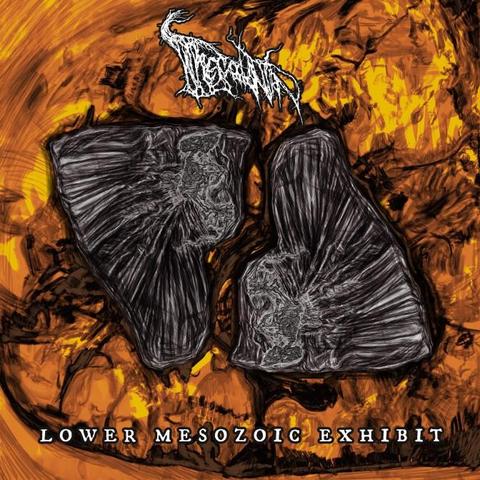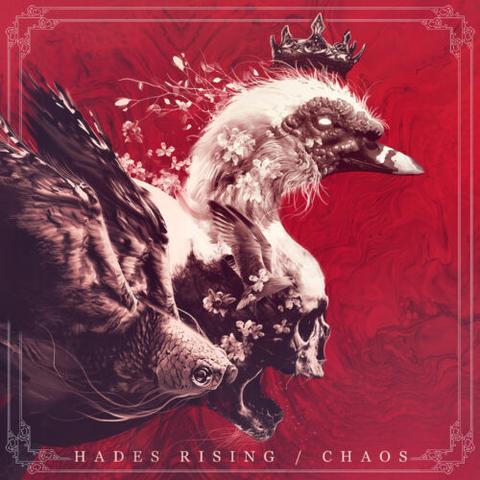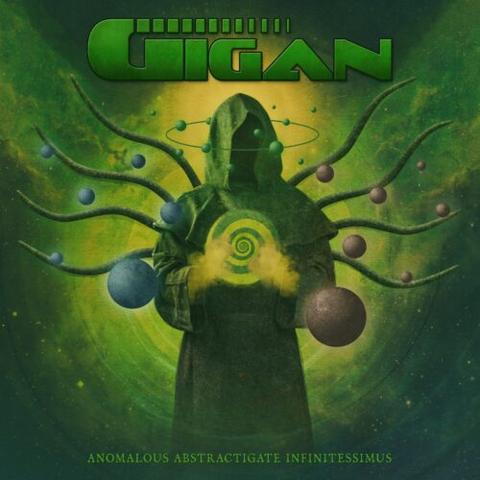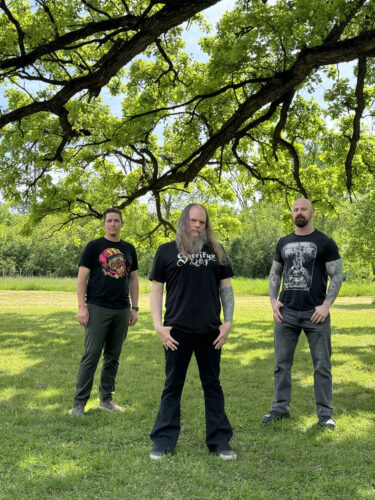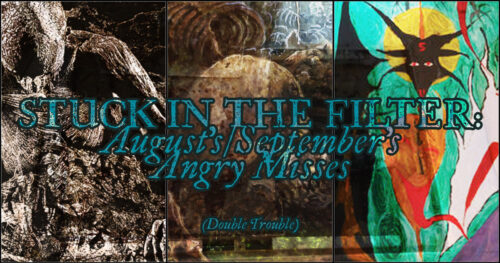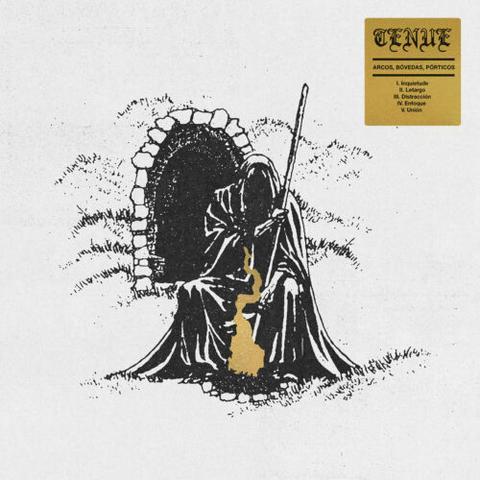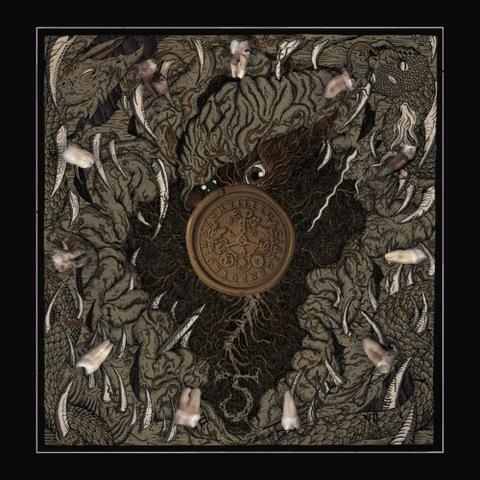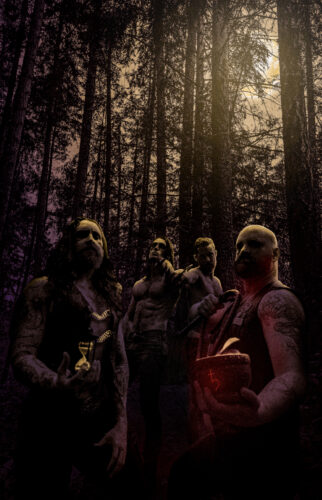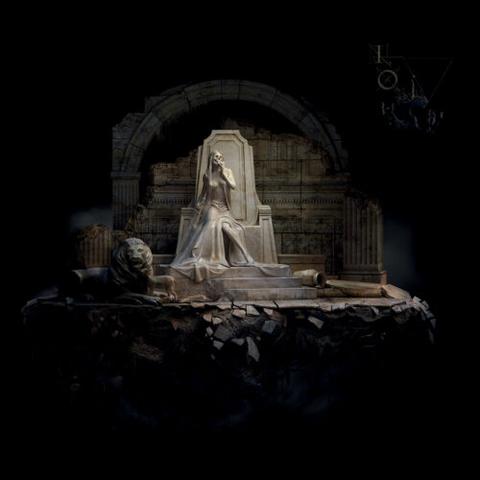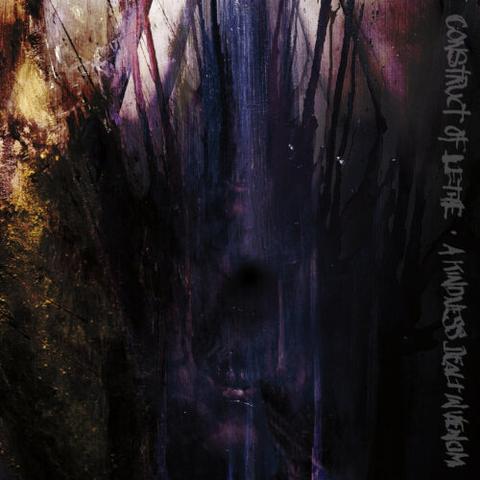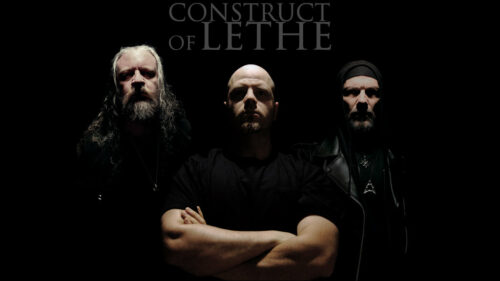Stuck in the Filter: August and September 2024
By Kenstrosity
I am a stubborn bitch. I work my underlings hard, and I won’t let up until they dig up shiny goodies for me to share with the general public. Share might be a generous term. Foist upon is probably more accurate…
In any case, despite some pretty intense setbacks on my end, I still managed to collect enough material for a two-month spread. HUZZAH! REJOICE! Now get the hell away from me and listen to some of our very cool and good tunes.
Kenstrosity’s Turgid Truncheons
Tenue // Arcos, bóvedas, pórticos [August 1st, 2024 – Self-Release]
Spanish post-black/crust/screamo quartet Tenue earned my favor with their debut record, Anábasis, back in 2018. Equal parts vicious, introspective, and strangely uplifting, that record changed what I thought I could expect from anything bearing the screamo tag. By integrating ascendant black metal tremolos within post-punk structures and crusty attitude, Tenue established a sound that not only opened horizons for me taste-wise but also brought me a great deal of emotional catharsis on its own merit. Follow-up Arcos, bóvedas, pórticos deepens that relationship. Utilizing a wider atmospheric palette (“Distracción”), a shift towards epic song lengths (“Inquietude, and a greater variety of instrumentation (observe the beautiful horns on long-form opener “Inquietude”), and a bluesier swagger than previous material exhibited (“Letargo”), Tenue’s second salvo showcases a musical versatility I wasn’t expecting to complement the bleeding-heart emotional depth I knew would return. This expansion of scale and skillset sets the record apart from almost anything else I’ve heard this year. Even though one or two moments struggle to stick long-term (“Enfoque”), Arcos, bóvedas, pórticos represents an affecting, creative, and ridiculously engaging addition to my listening schedule. And for the low low price of NYP, it ought to be a part of yours as well.
Open Flesh Wound // Vile Putrefaction [August 28th, 2024 – Inherited Suffering Records]
Thicc, muggy slam with a million pick scrapes. Who could ask for anything more? Not I, and so it is with great pleasure that I introduce to my AMG fam Pennsylvania’s very own Open Flesh Wound and their debut LP Vile Putrefaction. Essentially the result of Analepsy’s and Devourment‘s carnal lovemaking, Vile Putrefaction is a nasty, slammy, brutal expulsion of chunky upchuck. Only those with the most caved-in craniums will appreciate the scraping swamp-ass riffs showcased on such slammers as “Smashed in Liquids” and “Cinder Block to the Forehead,” or the groove-laden thuggery of death-focused tracks like the title track, “Fermented Intestinal Blockage” and “Body Baggie.” Vile Putrefaction’s molasses-like production is an absolute boon to this sound as well, with just enough gloss to provide a deliciously moist texture which imparts an unlikely clarity to especially gruesome details in “Stoma Necrosis” and “Skin Like Jelly.” It’s dumb as hell, and isn’t doing anything new, but is an overdose of good, dirty fun. Simple as.
The Flaying // Ni dieu, ni maître [September 5th, 2024 – Self Release]
I’ve been singing Canadian melodic death metal quartet The Flaying’s praises for almost six years now. And still to this day not enough people choose to sing with me. Why? Because they wouldn’t know sickeningly fun death metal if it hacked their faces right off. That’s okay, because The Flaying do hack faces right off regardless, and it feels so good to watch the faces of those who don’t heed my call get hacked right off. Third onslaught Ni dieu, ni maître proves that once again, The Flaying are an unstoppable force of bass wizardry, riff mastery, and hook-laden songwriting. Opener “Le nécrologiste” perfectly encapsulates The Flaying’s particularly addicting brew of Cannibal Corpse, The Black Dahlia Murder, and De Profundis influences, shaken and stirred until the resulting cocktail blooms with a flavor all its own. Technical and brutally fast, follow-up track “L’enclave” continues the deadly rampage, featuring noodly bass lines guaranteed to elicit stank face in the even most prim and proper elite. A trim twenty nine minutes, spread over ten tightly trained tracks, Ni dieu, ni maître boasts unbeatable replay value. Highlights “Ni dieu, ni maître,” “Les Frondes” “La forge,” and “Noyau sombre” seal the deal by providing sharp hard points and memorable landmarks to which any listener would look forward. Simply put, this record rocks my socks and further proves that I am right about The Flaying, and those who ignore my recommendation are wrong.
Dolphin Whisperer’s All-Seeing Affirmations
Eye Eater // Alienate [August 1st, 2024 – Self Release]
In a post-Ulcerate world, the modern output of atmosphere-minded death metal has grown exponentially. With ringing dissonant chords and slow post-informed builds taking center stage, bands like New Zealand’s unheralded Eye Eater borrow plenty from the Destroyers of All sound. However, while many acts would be content to dial in the space or ramp up the dissonance to try and put their own twist on this growing post-death movement, Eye Eater looks to the laser-precise melodic tones of progressive, core-borrowing names like Fallujah and Vildhjarta to carve an identity into each of Alienate’s album eight sprawling tracks. Swinging sustained brightness in one hand about the grizzly chug-crush of the other, burly bangers like “Other Planets” and “Failure Artifacts” find churning, djentrified grooves that amplify the swell of the blaring melodies that swirl above the low-end clamor. And though the main refrains of “Alienate” and “Everything You Fear and Hope For” sound like loving odes to their Kiwi Forebears, the growth into sonorous and lush-chorded peaks lands much closer to the attraction of turn of the 10s progressive death/metalcore luminaries The Contortionist had they stayed closer to their heavy-toned, hefty-voiced roots. As an anonymous act with little social presence, it’s hard to say whether Eye Eater has more cooking for the future. With their ears tuned to the recent past for inspiration, it’s easy to see how a band with this kind of melodic immediacy—still wrapped in the weight of a brooding, death metal identity—could easily play for the tops of underground charts. To those who have been following the twists and turns of both underground and accessible over the past decade or so, Eye Eater may not sound entirely novel. But Alienate’s familiarity in presence against its quality of execution and fullness of sound makes it easy to ensnare all the same.
Dissolve // Polymorphic Ways of Unconsciousness [September 20th, 2024 – Self Release]
From the sand-blasted, monochrome human escaping the floor of Polymorphic Ways’ cover to the tags of technical, progressive, death that adorn the Bandcamp tags, it’s easy to put a band like Dissolve in a box, mentally. But with the first bent guitar run that sets off “Efficiency Defiled” in a run like Judas Priest more than Spawn of Possession, it’s clear that Dissolve plays by a different set of rules than your average chug and run tech death band. Yet true to their French nature, the riffs that litter Polymorphic Ways of Unconsciousness possess a tangible groove following the footsteps of lesser-known tricksters Trepalium and Olympic titans of metal Gojira (“The Great Pessimistic,”1 “Polymorphic Ways of Unconsciousness,” “Vultures”). And while too Dissolve finds a base in the low-end trem assault of Morbid Angel (“Ignorance Will Prevail”), there’s a thrash and bark energy at play that nets a rambunctious and experimental sound recalling the warped Hetfield-ian (Metallica) scrawl of Destroy Erase Improve Meshuggah, right down to the monstrous bass tone that defines Sonny Bellonie’s (Sanctuary, ODC) growling, extended range performance. As a trio it’d be easy for guitarist Briac Turquety (Smerter, ex-Sideburn) to rely on overdubs for saturation of sound and complexity of layers—and for solo cut-ins he definitely does—but equally as often his choice to let certain chords and notes escape a thrashy muting to ring in distorted harmony against snaking bass lines. And speaking of solos, Turquety’s prowess ranges from bluesy shred (“The Great Pessimistic,” “Ropes of Madness”) to noisy, jazzy explorations (“Polymorphic…,” “Shattered Minds of Evolution”) to Satriani on Slayer whammy abuse (“Bonfire of the Vanities”)—a true treat to lovers of tasteful shred. Turquety, Bellonie, and Quentin Feron (on drums, also of Smerter) sound as if they’ve been playing together for much longer than the year that Dissolve has existed. With a debut this polished, it’s anyone’s guess as to what kind of monster will emerge from the talent that appears so effortless in assembly.
Obsidian Mantra // As We All Will [September 27th, 2024 – Self Release]
Sometimes, a tangled and foreboding cover sits as the biggest draw amongst a crowd of death metal albums alight with splattered zombie remains, illegible logos, and alarm-colored palettes. And in the case of Obsidian Mantra, it doesn’t hurt that lead single “Cult of Depression” possesses a devastating, hypnotic groove that recalls the once captivating technical whiplash of an early Decapitated. However, rather than wrestle with tones that incite a pure and raw violence like that cornerstone act (or similar Poldeath that has followed in its legacy like Dormant Ordeal), Obsidian Mantra uses aggressive and bass-loaded rhythmic forms to erupt in spacious and glass-toned guitar chimes to create an engrossing neck-snapping (“Slave Without a Master,” “Condemned to Oppression”). Whether we call these downcast refrains a dissonant melody or slowly resolving phrase, they grow throughout each track in a manner that calls continual reinforcement from a rhythm section that can drop into hammering blasts at a dime and a vocal presence that oscillates between vicious snarl and reverberating howl. In its most accessible numbers (“Chaos Will Consume Us All,” “Weavers of Misery”), Obsidian Mantra finds an oppressive warmth that grows to border anthemic, much in the way like beloved blackened/progressive acts like Hath do with their biggest moments. As We All Will still never quite reaches that full mountainous peak, though, opting to pursue the continual call of the groove to keep the listener coming back. Having come a long way from the Meshuggah-centered roots where Obsidian Mantra first sowed their deathly seeds, As We All Will provides 30 minutes of modern, pulsating, and venomous kick-driven pieces that will flare easy motivation for either a brutalizing pit or a mightily-thrusted iron on leg day.
Thus Spoke’s Cursed Collection
Esoctrilihum // Döth-Derniàlh [September 20th, 2024 – I, Voidhanger Records]
We complete another orbit around the Sun, and Esoctrilihum completes another album; such are the inalterable laws governing each 365.25 Earth day period in our Solar System. Possessed by some mad, restless spirit, it seems they cannot be stopped. Ever the experimenter, sole member Asthâghul now picks up an acoustic guitar, a nickelharpa, and warms up his throat for more clean vocals to further bizarre-ify his avant-garde black metal. As we travel into the cosmos for Döth-Derniàlh, Esoctrilihumisms abound in the see-sawing strings and echoes of chanted singing and throaty snarls. The addition of more acoustic elements does bring some weird delicacy to moments here and there (“Zilthuryth (Void of Zeraphaël),” “Murzaithas (Celestial Voices)”), and it adds layers of beauty in addition to those already harmonious passages. it’s striking how well these new instruments blend with the overall sound: so well, in fact, that it almost feels like Esoctrilihum hasn’t evolved at all. This isn’t even a bad thing, because Döth-Derniàlh still feels like an improvement. Past albums have always had at least sections of perfection, where the scattered clouds of self-interfering chaos or repetition blow away and the brilliant light of the moon shines strongly. Döth-Derniàlh has more of these than ever, some extending to whole, 16-minute songs (“Dy’th Eternalhys (The Mortuary Renewal),”).2 If you have it in you to listen to one (more) album over an hour long, and you don’t already know you hate Esoctrilihum, sit down with a drink, and maybe a joint, and go where Döth-Derniàlh takes you.
#2024 #Alienate #AmericanMetal #ArcosBóvedasPórticos #AsWeAllWill #AtmosphericDeathMetal #Aug24 #AvantGarde #BlackMetal #BrutalDeathMetal #CanadianMetal #CannibalCorpse #DeProfundis #DeathMetal #Decapitated #Dissolve #DormantOrdeal #DöthDerniàlh #Esoctrilihum #EyeEater #Fallujah #FrenchMetal #Gojira #GrandMagus #GrendelSSÿster #Gygax #HarcorePunk #IVoidhangerRecords #InheritedSufferingRecords #JethroTull #JudasPriest #MelodicDeathMetal #Meshuggah #Metallica #MorbidAngel #NewZealandMetal #NiDieuNiMaîTre #ObsidianMantra #ODC #OpenFleshWound #PolishMetal #PolymorphicWaysOfUnconsciousness #PostDeathMetal #PostMetal #postPunk #ProgressiveDeathMetal #ProgressiveMetal #Punk #Sanctuary #Screamo #SelfRelease #Sep24 #Sideburn #Slam #Slayer #Smerter #SpanishMetal #SpawnOfPossession #StuckInTheFilter #StuckInTheFilter2024 #TechnicalDeathMetal #Tenue #TheBlackDahliaMurder #TheContortionist #TheFlaying #ThinLizzy #Trepalium #Vildhjarta #VilePutrefaction #WishboneAsh
